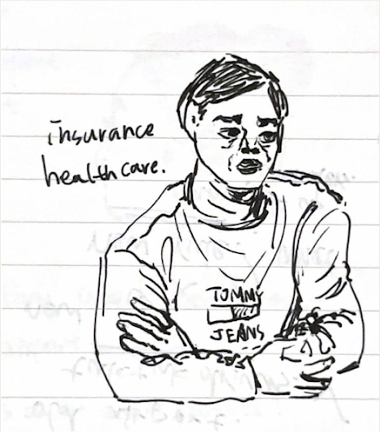Learning About Labor Relations in Cambodia
By Alyssa Brundage '24 | Editor, Scheinman Institute Newsletter and Blog
This past January, Cornell’s Southeast Asia Program (SEAP) collaborated with the School of Industrial and Labor Relations and the Center for Khmer Studies in Cambodia to host a unique study abroad opportunity. Students were brought to Cambodia for a two week in-country learning experience. Designed by Professor Vida Vanchan, Director of the Global Studies Institute and Professor of Geosciences at SUNY Buffalo State University, and co-taught by Scheinman Instructor and Institute Advisory Board member Richard Fincher, the course offered a comprehensive understanding of Cambodia, from past to present, focusing on labor, development, and society. This comprehensiveness is drawn from a prior version of the course, envisioned, designed, and co-taught by Professor Vanchan and ILR Professor Sarosh Kuruvilla in January of 2020.
As Fincher explains, “The class was designed with multiple objectives. First was to introduce students to Cambodian economic, social, and labor developments, starting by examining Cambodia’s history (and ancient architecture) to provide the background to its economy and society. Next was to explore Cambodia’s more recent developments, focusing on the role of political institutions, economic development strategies, human rights, and labor policies.” The course narrowed in on the development of the Cambodian garment industry.
As a student who participated in the program, I can say the professors exceeded these objectives. My time in Cambodia this winter was undoubtedly one of the highlights of my undergraduate experience.
We began our time in Cambodia in Siem Reap, a city that highlights the glory of the Angkorian period. While there, we explored multiple of the country’s famous temples which offered a historical perspective and served as a comparison for future developments. We also visited Artisans Angkor, a social business enterprise that teaches traditional Khmer craftsmanship to people from rural areas. We found the silk weaving especially captivating. A fellow student participant, Laurel Whidden, Global and Health Sciences ‘26 shares her experience at Angkor Artisan below.
Our learning was further supplemented by readings, lectures, and meetings with various stakeholders in the industry. One critical discussion we had was with Mr. Nimol and union leaders from the AFL-CIO Solidarity Center in Siem Reap. His lecture focused on the impact of union fragmentation. We also discussed minimum wage negotiations and the impact it has on the garment industry. Union leaders shared their most prevalent obstacles for members.

Illustration of union leader by fellow student Lucy Cao, Global Development ‘26
The majority of our trip was spent in the nation's capital, Phnom Penh. We explored the Royal Palace, the Tonle Sap and Mekong Rivers, and night markets. Our time in Phnom Penh also brought us closer to the leadership of Cambodia. We met with the Minister of Industry, Science, Technology, and Innovation, His Excellency Mr. Vanndy HEM. He shared perspectives concerning the development of Cambodia, the needed support for the current infrastructure, and how he envisions the future of the country. Our other discussion with the Cambodian government was with His Excellency Dr. Siphana SOK, Senior Minister of Cambodia. He shared in-depth historical development timelines and challenges and echoed similar sentiments to H.E. Vanndy’s about the needed support for strengthening and enhancing human capital and infrastructure. He also shared his perspective on the resiliency of the Cambodian people and the impact Buddhist values have on society. Both conversations were a wonderful opportunity that I will carry with me for the rest of my life.
At this point in the trip, we had met with union leaders and government officials, leaving two key stakeholder groups: management organizations and the rank-and-file workers themselves. Our next visit was to TAFTAC, the Textile, Apparel, Footwear & Travel Goods Association in Cambodia. Mr. Ken Loo emphasized the substantial proportion of employment that the garment industry accounts for in Cambodia. He further shared the challenges of union fragmentation, and that it was difficult to know who to invite to the table. Lastly, Mr. Loo forecasted that the garment industry will eventually leave Cambodia for Africa. Dovanie Benjamin, Industrial and Labor Relations ‘26’ shares what she learned during the visit.
As someone who had spent the past several years learning about the garment industry, the next few days were the highlight of my time in Cambodia. All of our conversations thus far had prepared us for this point: visiting a garment factory. We toured the Sabrina Factory, which focuses on high quality athletic wear apparel. Although barred from taking photographs, the images of hundreds of workers are seared into my mind. I distinctly remember the sounds of the fans and machines roaring, all the while hands doing most of the work, bringing pieces of clothing to life. We too often forget the workers behind our clothes. The next day, we were allowed to visit and interview workers in their homes. The kindness of these people to share their space and stories with us was truly appreciated. We discussed working conditions, local healthcare options, and broader hopes for the future.
I cannot convey how comprehensive this course was. We studied numerous perspectives, including everyone from government officials to factory workers. This unique structure was carefully designed by those involved. As Vanchan explains, “One cannot learn and develop an authentic knowledge about a labor issue or a problem in the country without having a comprehensive understanding of the genesis, the history, the country, the people, and all parties involved.” Our experience was further advanced by Vanchan’s expertise, her being a native of the country, and her fluency in the language. Overall, I am incredibly thankful for the wonderful group of students and professors on this trip. I cannot thank everyone involved in this program enough, as it served not only as the highlight of my undergraduate experience but also as inspiration for a future career in international labor.
